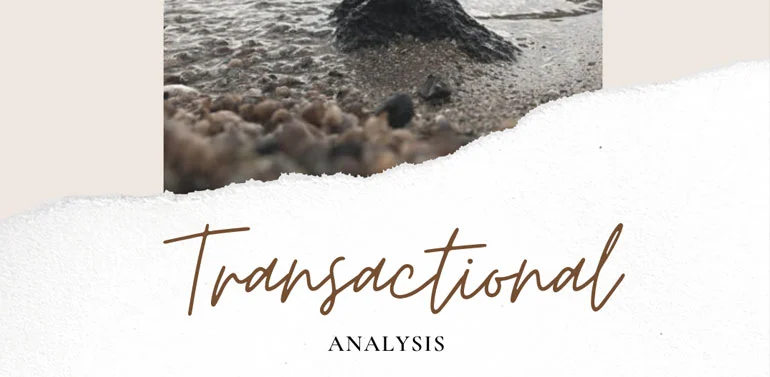Monks Risborough, Bucks, HP27
To book an introductory appointment

Transactional Analysis commonly referred to as TA, is therapy which focuses on observing your patterned ways of interacting with yourself and others. Essentially it looks at the ‘transactions’ you engage in both personally and inter-personally.
It does this by applying specific concepts to the information you share within your sessions. I’ve provided some examples below.
The PAC Model
This is the most commonly used part of TA. The belief is that in any given moment we are operating from one of three positions:
The theory suggests that the ‘adult’ position is the optimal position because here we are aware of ourselves and others, meaning we are able to respect ourselves, whilst respecting others, which leads to harmonious interactions. The people we are interacting with are able to maintain their adult state if we maintain ours.
If we are in our an adult position, we are telling someone something in a way that inflates our position of power over them. Leading people to comply or rebel (pushing others into their child state).
If we are in our child position, we disempower ourselves by inferring we need to taken care of. Leading people to nurture or control us (pushing others into their adult state).
This theory applies internally too and can therefore make sense of the relationship we have with ourselves. It explores when we care of ourselves, torment ourselves, remain rational, seek guidance and act out.
By holding an awareness of these positions, we are able to consciously alter the way in which we respond to things, in order to have a better relationship with ourselves and others.
Games
TA is really interested in exploring ‘The Games We Play’. In the same way that a PAC position can alter our interactions, the games we use can have a profound impact too. A game in this instance is a repeated pattern of behaviour that provides us with an identity, whilst it influences the responses we receive from others. There are many possible games we can adopt but I’ll provide two examples so you can get a feel for what I’m saying:
The But Game – saying but when you or someone else speaks, means you keep a problem alive and you ‘play the problem’.
I feel like my relationship is no good for me, but I love her.
Have you considered a trial separation?
Yes, but I’m scared that if I do that, she might realise she doesn’t want to be with me any more.
Would this not help to clarify how you both truly feel and if indeed you should stay together?
Yes, but I might want her and she might not want me.
Would it be appropriate for you to stay together if one of you didn’t want to be in the relationship?
No, but I wouldn’t want her to end the relationship.
You can see how the but game allows the problem to continue, indefinitely. Every time a potential solution is raised, the person finds a new way to expand the problem. Drawing attention to the game, can raise the person’s awareness. It can help them to decipher whether the problem is indeed the problem at all or if something else is at play. Perhaps in this instance, the person has a strong fear of not being a good enough partner and instead of expressing this, dances around the issue of whether the relationship is right or wrong. Once the game is moved to one side, the true issues underneath the game can be attended to.
The I’m So Stupid Game – calling yourself stupid when you think you could have done something better, means that you attack yourself before anyone else can, interestingly it also means that you buy yourself lots of compliments and reassurance.
I dropped the kids off at school this week, I was the only one there. It wasn’t until no one else turned up that I realised I hadn’t put my clocks forward, I’m so stupid.
No you’re not, it’s a simple mistake, you’re a good mum.
Well I drove us home again and stupidly forgot that the traffic builds up at that time of the morning. By the time I got the kids back to school, they ended up being 15 minutes late. I’m such an idiot.
You sound as if you were preoccupied, still processing the fact you’d arrived early at school.
How stupid must I be, to then make us late though?!
By inferring and demanding that your stupid, two things usually occur. Firstly the person listening automatically attempts to soothe you. Secondly you defiantly reinforce the idea until it’s impossible for the other person to respond with an alternative, confirming your sense of being stupid. Gradually the stupid game will eliminate your self-esteem and self-worth.
Whereas the therapist will identify the game at play and seek to break the pattern. They might say something like,
“I really get a sense that you want to punish yourself. You feel you did something stupid and that you need to acknowledge the notion that your actions make you a bad person. I’d like if you can, to know that this has been acknowledged. Now I’d like you to tell me what you think you did well that morning.”
“I got my kids to school and I didn’t give up.”
“And what might those two things say about you?”
“That I’m determined to be a good mum.”
There are a string of games we play, repeatedly reinforcing the things we believe about ourselves. However TA provides an opportunity for the games to be acknowledged sensitively and safely, so that we can raise our awareness in relation to our unhelpful patterns. We explore why they might be at play, what might be fueling them, how they might be counteracted and what difference it makes when they are.
Scripts – each of us has a story. A way of explaining who we are, that helps us to make sense of our place and position in the world. If I asked you to write an A4 page telling me about your life, you’d have something to say, I’m sure. But the way in which you’d write that story would be very telling about the beliefs you hold about yourself. Below I’ve provided a simple example:
Version 1 – I’m Sally. I am the youngest of three children, I grew up in a remote area, always feeling bored. I moved away as quickly as I could, seeking stimulation. I lived in the city, had a string of casual boyfriends, settled for a guy named Mark. We got married, had two kids. Moved back to the country so we could give our kids a good life. I’m not happy there. My job is boring, my kids bore me, Mark bores me. I’m fed up and I don’t know if I’ll ever feel happy.
By listening to Sally as a Transactional Analyst I’d pick up on her script, whether she said it this directly or not. I’d listen out for the ways in which she describes her life, her challenges and her feelings. Gently I’d feed back to her the things I notice. Through our work I’d explore with Sally, the possibility of reframing her script. I’d maybe ask her to consider telling her story in way that seeks to inspire or educate others for example. She might one day come to a session and say:
Version 2 – I’m Sally. I’m the youngest of three children, which in my family, meant everyone looked out for me. We grew up in the country which meant we had to be resourceful when it came to entertaining ourselves. I moved away from home at a young age because I was keen to find out what life had to offer. Life was colourful when I first got to the city but I recognised this wasn’t sustainable. Instead I found a man who cherished me. A man with good values and a strong work ethic. A man who provides for me and makes me feel safe. Together we decided to move back to the country so we could give our children the sense of safety and connection with nature, that we’d both benefited from whilst growing up. Through my therapy I’ve come to realise how important creativity and a sense of stimulation is for me and my family. I recognise that I can take responsibility for making our life interesting, wherever we live. The more I do this, the more my family get involved. We feel like we operate as a little team now and I rarely feel bored.
Sally didn’t arrive at version 2 overnight, she worked hard at processing the frustrations she’d been carrying with her. But gradually she was able to see the positives of herearlier life, recognise her strengths and feel more spirited about her present life. As she took more responsibility for her situation and choices, she became much happier.
TA helps you to identify the script you have and rework it into something you want to have.
There are many other elements to TA but hopefully this has given you an insight into how, by exploring your transactions, you can seek to improve the relationship you have with yourself and others.

No matter where you are based in the UK, Rebecca is only a call or a message away, if you would like to arrange Counselling or Therapy sessions.
Monks Risborough, Bucks, HP27
We take your privacy seriously and will only ever use your personal information to provide details you have requested.
2023 White Barn Therapy | Web Design by JWD Ltd